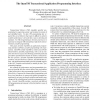173 search results - page 13 / 35 » The Atomos transactional programming language |
IEEEPACT
2007
IEEE
15 years 3 months ago
2007
IEEE
Transactional Memory (TM) simplifies parallel programming by supporting atomic and isolated execution of user-identified tasks. To date, TM programming has required the use of l...
PLDI
2009
ACM
15 years 4 months ago
2009
ACM
Multicore designs have emerged as the mainstream design paradigm for the microprocessor industry. Unfortunately, providing multiple cores does not directly translate into performa...
86
Voted
ASPLOS
2010
ACM
15 years 4 months ago
2010
ACM
With the right techniques, multicore architectures may be able to continue the exponential performance trend that elevated the performance of applications of all types for decades...
PLDI
2012
ACM
13 years 2 days ago
2012
ACM
This paper addresses the problem of reducing unnecessary conflicts in optimistic synchronization. Optimistic synchronization must ensure that any two concurrently executing trans...
ASPLOS
2008
ACM
14 years 11 months ago
2008
ACM
Concurrency control is one of the main sources of error and complexity in shared memory parallel programming. While there are several techniques to handle concurrency control such...



